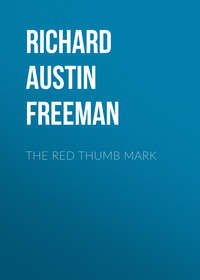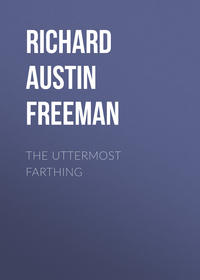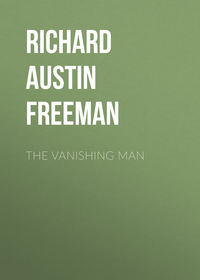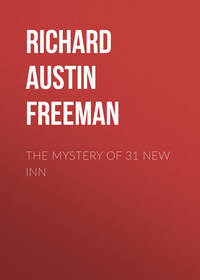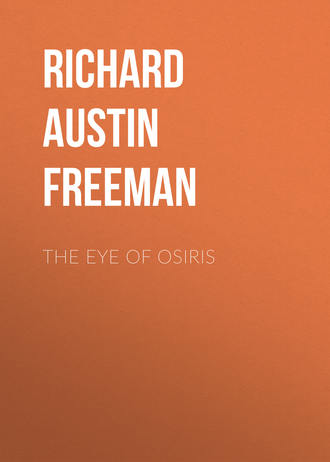 полная версия
полная версияThe Eye of Osiris
"Then to take the third alternative: Did he leave the house unobserved? Well, it is not impossible, but it would be a queer thing to do. He may have been an impulsive or eccentric man. We can't say. We know nothing about him. But two years have elapsed and he has never turned up, so that if he left the house secretly he must have gone into hiding and be hiding still. Of course, he may have been the sort of lunatic who would behave in that manner or he may not. We have no information as to his personal character.
"Then there is the complication of the scarab that was picked up in the grounds of his brother's house at Woodford. That seems to show that he visited that house at some time. But no one admits having seen him there; and it is uncertain, therefore, whether he went first to his brother's house or to Hurst's. If he was wearing the scarab when he arrived at the Eltham house, he must have left that house unobserved and gone to Woodford; but if he was not wearing it he probably went from Woodford to Eltham, and there finally disappeared. As to whether he was or was not wearing the scarab when he was last seen alive by Hurst's housemaid, there is at present no evidence.
"If he went to his brother's house after his visit to Hurst, the disappearance is more understandable if we don't mind flinging accusations of murder about rather casually; for the disposal of the body would be much less difficult in that case. Apparently no one saw him enter the house, and, if he did enter, it was by a back gate which communicated with the library—a separate building some distance from the house. In that case it would have been physically possible for the Bellinghams to have made away with him. There was plenty of time to dispose of the body unobserved—temporarily, at any rate. Nobody had seen him come to the house, and nobody knew that he was there—if he was there; and apparently no search was made either at the time or afterward. In fact, if it could be shown that the missing man left Hurst's house alive, or that he was wearing the scarab when he arrived there, things would look rather fishy for the Bellinghams—for, of course, the girl must have been in it if the father was. But there's the crux: there is no proof that the man ever did leave Hurst's house alive. And if he didn't—but there! as I said at first, whichever turning you take, you find that it ends in a blind alley."
"A lame ending to a masterly exposition," was Thorndyke's comment.
"I know," said Jervis. "But what would you have? There are quite a number of possible solutions, and one of them must be the true one. But how are we to judge which it is? I maintain that until we know something of the parties and the financial and other interests involved we have no data."
"There," said Thorndyke, "I disagree with you entirely. I maintain that we have ample data. You say that we have no means of judging which of the various possible solutions is the true one; but I think that if you read the report carefully and thoughtfully you will find that the facts now known point to one explanation, and one only. It may not be the true explanation, and I don't suppose it is. But we are now dealing with the matter speculatively, academically, and I contend that our data yield a definite conclusion. What do you say, Berkeley?"
"I say that it is time for me to be off; the evening consultations begin at half-past six."
"Well," said Thorndyke, "don't let us keep you from your duties, with poor Barnard currant picking in the Grecian Isles. But come in and see us again. Drop in when you like after your work is done. You won't be in our way even if we are busy, which we very seldom are after eight o'clock."
I thanked Dr. Thorndyke most heartily for making me free of his chambers in this hospitable fashion and took my leave, setting forth homeward by way of Middle Temple Lane and the Embankment; not a very direct route for Fetter Lane, it must be confessed; but our talk had revived my interest in the Bellingham household and put me in a reflective vein.
From the remarkable conversation that I had overheard it was evident that the plot was thickening. Not that I supposed that these two respectable gentlemen really suspected one another of having made away with the missing man; but still, their unguarded words, spoken in anger, made it clear that each had allowed the thought of sinister possibilities to enter his mind—a dangerous condition that might easily grow into actual suspicion. And then the circumstances really were highly mysterious, as I realized with especial vividness now after listening to my friend's analysis of the evidence.
From the problem itself my mind traveled, not for the first time during the last few days, to the handsome girl, who had seemed in my eyes the high-priestess of this temple of mystery in the quaint little court. What a strange figure she had made against this strange background, with her quiet, chilly, self-contained manner, her pale face, so sad and worn, her black, straight brows and solemn gray eyes, so inscrutable, mysterious, Sibylline. A striking, even impressive, personality this, I reflected, with something in it somber and enigmatic that attracted and yet repelled.
And here I recalled Jervis's words: "The girl must have been in it if the father was." It was a dreadful thought, even though only speculatively uttered, and my heart rejected it; rejected it with indignation that rather surprised me. And this notwithstanding that the somber black-robed figure that my memory conjured up was one that associated itself with the idea of mystery and tragedy.
CHAPTER IV
LEGAL COMPLICATIONS AND A JACKAL
My meditations brought me by a circuitous route, and ten minutes late, to the end of Fetter Lane, where, exchanging my rather abstracted air for the alert manner of a busy practitioner, I strode briskly forward and darted into the surgery with knitted brows, as though just released from an anxious case. But there was only one patient waiting, and she saluted me as I entered with a snort of defiance.
"Here you are, then?" said she.
"You are perfectly correct, Miss Oman," I replied; "in fact, you have put the case in a nutshell. What can I have the pleasure of doing for you?"
"Nothing," was the answer. "My medical adviser is a lady; but I've brought a note from Mr. Bellingham. Here it is," and she thrust the envelope into my hand.
I glanced through the note and learned that my patient had had a couple of bad nights and a very harassing day. "Could I have something to give me a night's rest?" it concluded.
I reflected for a few moments. One is not very ready to prescribe sleeping draughts for unknown patients, but still, insomnia is a very distressing condition. In the end I temporized with a moderate dose of bromide, deciding to call and see if more energetic measures were necessary.
"He had better take a dose of this at once, Miss Oman," said I, as I handed her the bottle, "and I will look in later and see how he is."
"I expect he will be glad to see you," she answered, "for he is all alone to-night and very dumpy. Miss Bellingham is out. But I must remind you that he's a poor man and pays his way. You must excuse my mentioning it."
"I am much obliged to you for the hint, Miss Oman," I rejoined. "It isn't necessary for me to see him, but I should like just to look in and have a chat."
"Yes, it will do him good. You have your points, though punctuality doesn't seem to be one of them," and with this parting shot Miss Oman bustled away.
Half-past eight found me ascending the great, dim staircase of the house in Nevill's Court preceded by Miss Oman, by whom I was ushered into the room. Mr. Bellingham, who had just finished some sort of meal, was sitting hunched up in his chair gazing gloomily into the empty grate. He brightened up as I entered, but was evidently in very low spirits.
"I didn't mean to drag you out after your day's work was finished," he said, "though I am very glad to see you."
"You haven't dragged me out. I heard you were alone, so I just dropped in for a few minutes' gossip."
"That is really kind of you," he said heartily. "But I'm afraid you'll find me rather poor company. A man who is full of his own highly disagreeable affairs is not a desirable companion."
"You mustn't let me disturb you if you'd rather be alone," said I, with a sudden fear that I was intruding.
"Oh, you won't disturb me," he replied; adding, with a laugh: "It's more likely to be the other way about. In fact, if I were not afraid of boring you to death I would ask you to let me talk my difficulties over with you."
"You won't bore me," I said. "It is generally interesting to share another man's experiences without their inconveniences. 'The proper study of mankind is—man,' you know, especially to a doctor."
Mr. Bellingham chuckled grimly. "You make me feel like a microbe," he said. "However, if you would care to take a peep at me through your microscope, I will crawl on to the stage for your inspection, though it is not my actions that furnish the materials for your psychological studies. It is my poor brother who is the Deus ex machina, who, from his unknown grave, as I fear, pulls the strings of this infernal puppet-show."
He paused and for a space gazed thoughtfully into the grate as if he had forgotten my presence. At length he looked up and resumed:
"It is a curious story, Doctor—a very curious story. Part of it you know—the middle part. I will tell you it from the beginning, and then you will know as much as I do; for, as to the end, that is known to no one. It is written, no doubt, in the book of destiny, but the page has yet to be turned.
"The mischief began with my father's death. He was a country clergyman of very moderate means, a widower with two children, my brother John and me. He managed to send us both to Oxford, after which John went into the Foreign Office and I was to have gone into the Church. But I suddenly discovered that my views on religion had undergone a change that made this impossible, and just about this time my father came into a quite considerable property. Now, as it was his expressed intention to leave the estate equally divided between my brother and me, there was no need for me to take up any profession for a livelihood. Archeology was already the passion of my life, and I determined to devote myself henceforth to my favorite study, in which, by the way, I was following a family tendency; for my father was an enthusiastic student of ancient Oriental history, and John was, as you know, an ardent Egyptologist.
"Then my father died quite suddenly, and left no will. He had intended to have one drawn up, but had put it off until it was too late. And since nearly all the property was in the form of real estate, my brother inherited practically the whole of it. However, in deference to the known wishes of my father, he made me an allowance of five hundred a year, which was about a quarter of the annual income. I urged him to assign me a lump sum, but he refused to do this. Instead, he instructed his solicitor to pay me an allowance in quarterly instalments during the rest of his life; and it was understood that, on his death, the entire estate should devolve on me, or if I died first, on my daughter, Ruth. Then, as you know, he disappeared suddenly, and as the circumstances suggested that he was dead, and there was no evidence that he was alive, his solicitor—a Mr. Jellicoe—found himself unable to continue the payment of the allowance. On the other hand, as there was no positive evidence that my brother was dead, it was impossible to administer the will."
"You say the circumstances suggested that your brother was dead. What circumstances were they?"
"Principally the suddenness and completeness of the disappearance. His luggage, as you may remember, was found lying unclaimed at the railway station; and there was another circumstance even more suggestive. My brother drew a pension from the Foreign Office, for which he had to apply in person, or, if abroad, produce proof that he was alive on the date when the payment became due. Now, he was exceedingly regular in this respect; in fact, he had never been known to fail, either to appear in person or to transmit the necessary documents to his agent, Mr. Jellicoe. But from the moment when he vanished so mysteriously to the present day, nothing whatever has been heard of him."
"It's a very awkward position for you," I said, "but I should think there will not be much difficulty in obtaining the permission of the Court to presume death and to proceed to prove the will."
Mr. Bellingham made a wry face. "I expect you are right," he said, "but that doesn't help me much. You see, Mr. Jellicoe, having waited a reasonable time for my brother to reappear, took a very unusual but, I think, in the special circumstances, a very proper step; he summoned me and the other interested party to his office and communicated to us the provisions of the will. And very extraordinary provisions they turned out to be. I was thunderstruck when I heard them. And the exasperating thing is that I feel sure my poor brother imagined that he had made everything perfectly safe and simple."
"They generally do," I said, rather vaguely.
"I suppose they do," said Mr. Bellingham; "but poor John has made the most infernal hash of his will, and I am certain that he has utterly defeated his own intentions. You see, we are an old London family. The house in Queen Square where my brother nominally lived, but actually kept his collection, has been occupied by us for generations, and most of the Bellinghams are buried in St. George's burial-ground close by, though some members of the family are buried in other churchyards in the neighborhood. Now, my brother—who, by the way, was a bachelor—had a strong feeling for the family traditions, and he stipulated, not unnaturally, in his will that he should be buried in St. George's burial-ground among his ancestors, or, at least, in one of the places of burial appertaining to his native parish. But instead of simply expressing the wish and directing his executors to carry it out, he made it a condition affecting the operation of the will."
"Affecting it in what respect?" I asked.
"In a very vital respect," answered Mr. Bellingham. "The bulk of the property he bequeathed to me, or if I predeceased him, to my daughter Ruth. But the bequest was subject to the condition I have mentioned—that he should be buried in a certain place—and if that condition was not fulfilled, the bulk of the property was to go to my cousin, George Hurst."
"But in that case," said I, "as you can't produce the body, neither of you can get the property."
"I am not so sure of that," he replied. "If my brother is dead, it is pretty certain that he is not buried in St. George's or any of the other places mentioned, and the fact can easily be proved by production of the registers. So that a permission to presume death would result in the handing over to Hurst of almost the entire estate."
"Who is the executor?" I asked.
"Ah!" he exclaimed, "there is another muddle. There are two executors; Jellicoe is one, and the other is the principal beneficiary—Hurst or myself, as the case may be. But, you see, neither of us can become an executor until the Court has decided which of us is the principal beneficiary."
"But who is to apply to the Court? I thought that was the business of the executors."
"Exactly, that is Hurst's difficulty. We were discussing it when you called the other day, and a very animated discussion it was," he added, with a grim smile. "You see, Jellicoe naturally refuses to move in the matter alone. He says he must have the support of the other executor. But Hurst is not at present the other executor; neither am I. But the two of us together are the co-executor, since the duty devolves upon one or other of us, in any case."
"It's a complicated position," I said.
"It is; and the complication has elicited a very curious proposal from Hurst. He points out—quite correctly, I am afraid—that as the conditions as to burial have not been complied with, the property must come to him, and he proposes a very neat little arrangement, which is this: That I shall support him and Jellicoe in their application for permission to presume death and to administer the will, and that he shall pay me four hundred a year for life; the arrangement to hold good in all eventualities."
"What does he mean by that?"
"He means," said Bellingham, fixing me with a ferocious scowl, "that if the body should turn up at any future time, so that the conditions as to burial should be able to be carried out, he should still retain the property and pay me the four hundred a year."
"The deuce!" said I. "He seems to know how to drive a bargain."
"His position is that he stands to lose four hundred a year for the term of my life if the body is never found, and he ought to stand to win if it is."
"And I gather that you have refused this offer?"
"Yes; very emphatically, and my daughter agrees with me; but I am not sure that I have done the right thing. A man should think twice, I suppose, before he burns his boats."
"Have you spoken to Mr. Jellicoe about the matter?"
"Yes, I have been to see him to-day. He is a cautious man, and he doesn't advise me one way or the other. But I think he disapproves of my refusal; in fact, he remarked that a bird in the hand is worth two in the bush, especially when the whereabouts of the bush is unknown."
"Do you think he will apply to the Court without your sanction?"
"He doesn't want to; but I suppose, if Hurst puts pressure on him, he will have to. Besides, Hurst, as an interested party, could apply on his own account, and after my refusal he probably will; at least, that is Jellicoe's opinion."
"The whole thing is a most astonishing muddle," I said, "especially when one remembers that your brother had a lawyer to advise him. Didn't Mr. Jellicoe point out to him how absurd the provisions were?"
"Yes, he did. He tells me that he implored my brother to let him draw up a will embodying the matter in a reasonable form. But John wouldn't listen to him. Poor old fellow! he could be very pig-headed when he chose."
"And is Hurst's proposal still open?"
"No, thanks to my peppery temper. I refused it very definitely, and sent him off with a flea in his ear. I hope I have not made a false step; I was quite taken by surprise when Hurst made the proposal and got rather angry. You remember, my brother was last seen alive at Hurst's house—but there, I oughtn't to talk like that, and I oughtn't to pester you with my confounded affairs when you come in for a friendly chat, though I gave you fair warning, you remember."
"Oh, but you have been highly entertaining. You don't realize what an interest I take in your case."
Mr. Bellingham laughed somewhat grimly. "My case!" he repeated. "You speak as if I were some rare and curious sort of criminal lunatic. However, I'm glad you find me amusing. It's more than I find myself."
"I didn't say amusing; I said interesting. I view you with deep respect as the central figure of a stirring drama. And I am not the only person who regards you in that light. Do you remember my speaking to you of Doctor Thorndyke?"
"Yes, of course I do."
"Well, oddly enough, I met him this afternoon and we had a long talk at his chambers. I took the liberty of mentioning that I had made your acquaintance. Did I do wrong?"
"No. Certainly not. Why shouldn't you tell him? Did he remember my infernal case, as you call it?"
"Perfectly, in all its details. He is quite an enthusiast, you know, and uncommonly keen to hear how the case develops."
"So am I, for that matter," said Mr. Bellingham.
"I wonder," said I, "if you would mind my telling him what you have told me to-night? It would interest him enormously."
Mr. Bellingham reflected for a while with his eyes fixed on the empty grate. Presently he looked up, and said slowly:
"I don't know why I should. It's no secret; and if it were, I hold no monopoly in it. No; tell him, if you think he'd care to hear about it."
"You needn't be afraid of his talking," I said. "He's as close as an oyster; and the facts may mean more to him than they do to us. He may be able to give a useful hint or two."
"Oh, I'm not going to pick his brains," Mr. Bellingham said quickly and with some wrath. "I'm not the sort of man who goes round cadging for free professional advice. Understand that, Doctor."
"I do," I answered hastily. "That wasn't what I meant at all. Is that Miss Bellingham coming in? I heard the front door shut."
"Yes, that will be my girl, I expect; but don't run away. You're not afraid of her, are you?" he added as I hurriedly picked up my hat.
"I'm not sure that I'm not," I answered. "She is rather a majestic young lady."
Mr. Bellingham chuckled and smothered a yawn, and at that moment his daughter entered the room; and, in spite of her shabby black dress and a shabbier handbag that she carried, I thought her appearance and manner fully justified my description.
"You come in, Miss Bellingham," I said as she shook my hand with cool civility, "to find your father yawning and me taking my departure. So I have my uses, you see. My conversation is the infallible cure for insomnia."
Miss Bellingham smiled. "I believe I am driving you away," she said.
"Not at all," I replied hastily. "My mission was accomplished, that was all."
"Sit down for a few moments, Doctor," urged Mr. Bellingham, "and let Ruth sample the remedy. She will be affronted if you run away as soon as she comes in."
"Well, you mustn't let me keep you up," I said.
"Oh, I'll let you know when I fall asleep," he replied, with a chuckle; and with this understanding I sat down again—not at all unwillingly.
At this moment Miss Oman entered with a small tray and a smile of which I should not have supposed her capable.
"You'll take your toast and cocoa while they're hot, dear, won't you?" she said coaxingly.
"Yes, I will, Phyllis, thank you," Miss Bellingham answered. "I am only just going to take off my hat," and she left the room, followed by the astonishingly transfigured spinster.
She returned almost immediately as Mr. Bellingham was in the midst of a profound yawn, and sat down to her frugal meal, when her father mystified me considerably by remarking:
"You're late to-night, chick. Have the Shepherd Kings been giving trouble?"
"No," she replied; "but I thought I might as well get them done. So I dropped in at the Ormond Street library on my way home and finished them."
"Then they are ready for stuffing now?"
"Yes." As she answered she caught my astonished eye (for a stuffed Shepherd King is undoubtedly a somewhat surprising phenomenon) and laughed softly.
"We mustn't talk in riddles like this," she said, "before Doctor Berkeley, or he will turn us both into pillars of salt. My father is referring to my work," she explained to me.
"Are you a taxidermist, then?" I asked.
She hastily set down the cup that she was raising to her lips and broke into a ripple of quiet laughter.
"I am afraid my father has misled you with his irreverent expressions.
He will have to atone by explaining."
"You see, Doctor," said Mr. Bellingham, "Ruth is a literary searcher–"
"Oh, don't call me a searcher!" Miss Bellingham protested. "It suggests the female searcher at a police station. Say investigator."
"Very well, investigator or investigatrix, if you like. She hunts up references and bibliographies at the Museum for people who are writing books. She looks up everything that has been written on a given subject, and then, when she has crammed herself to a bursting-point with facts, she goes to her client and disgorges and crams him or her, and he or she finally disgorges into the Press."
"What a disgusting way to put it!" said his daughter. "However, that is what it amounts to. I am a literary jackal, a collector of provender for the literary lions. Is that quite clear?"
"Perfectly. But I don't think that, even now, I quite understand about the stuffed Shepherd Kings."
"Oh, it was not the Shepherd Kings who were to be stuffed. It was the author! That was mere obscurity of speech on the part of my father. The position is this: A venerable Archdeacon wrote an article on the patriarch Joseph–"


